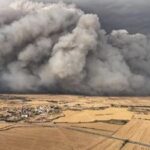Canadians across the country marked this year’s Canada Day with a surge of patriotism, in stark contrast to recent years. The celebration took on new significance following U.S. President Donald Trump’s suggestion that Canada should become the 51st state of the United States. The festivities, held on July 1, were a defiant response to Trump’s remarks, as well as ongoing trade tensions between the two nations.
Just a few years ago, Canada Day faced calls for cancellation due to the discovery of over 1,000 unmarked graves, believed to belong to Indigenous children. However, this year saw a remarkable shift as Canadians rallied to ensure the continuation of their national holiday. The celebrations included parades, festivals, and vows of national unity, with many participants wearing T-shirts emblazoned with slogans like “Canada is Not For Sale,” “Elbows Up,” and “Never 51.”
A Resurgence of National Pride
The announcement comes as Canadians are increasingly vocal about their national identity. Thousands turned out to celebrate the anniversary of Canadian Confederation, a clear snub to the U.S. president’s comments. Dave and Yvonne Kyba, attending the festivities in Montreal’s Old Port, wore matching “Not for sale” T-shirts. “We were so fired up after the comments were made initially,” Dave told The Gazette. “We just felt impassioned to say something back: no, we’re not.” Yvonne added, “We don’t want to be the 51st state. Point finale.”
Chrissy Krahn, another attendee, noted, “There’s a real sense of national pride that wasn’t there before. Because we’re very nice, right? We’re Canadians. But this has really awakened a little bit of a beast.”
Historical Context and Current Tensions
This development follows years of strained relations between Canada and the United States. In 2021, the discovery of unmarked graves led to significant introspection and calls to cancel Canada Day. However, Trump’s recent comments have galvanized a renewed sense of Canadian identity and unity.
Jim Kamp, who flew from Victoria to Ottawa for the celebrations, expressed newfound patriotism. “I don’t think I was really a very strong patriotic Canadian until now. I think this is definitely a turning point for a lot of Canadians,” he told The Globe and Mail.
In a March survey by the Harris Poll Canada, in partnership with Petro-Canada, seven in 10 Canadians said they were proud to be Canadian, up from 63% a month earlier. Eight in 10 emphasized the importance of buying Canadian products, while 92% intended to support Canadian companies more in the future.
Political Reactions and Economic Implications
Meanwhile, Canada’s new Prime Minister, Mark Carney, addressed the nation in a Canada Day message on social media. He remarked, “The world is changing. Old friendships are fraying.” Although he did not mention Trump by name, it was clear he referred to the U.S. president when discussing the economic impact of the trade war. “As the world becomes more divided and dangerous,” Carney stated, “Canadians are uniting.” He later described the mass celebrations as “A Canada Day for the books.”
The move represents a broader trend of rising Canadian patriotism since Trump took office. Recent polls indicate a significant increase in national pride, with many Canadians prioritizing local products and businesses. In Quebec, traditionally home to a strong separatist movement, flag makers have reported increased sales of the Canadian Maple Leaf as businesses embrace a “Buy Canada” movement.
Looking Forward
The celebrations underscore a pivotal moment for Canada, as citizens rally around their national identity in response to external pressures. As trade tensions persist and political rhetoric intensifies, the sense of unity and patriotism displayed on Canada Day may serve as a foundation for future national solidarity.
As Canadians continue to navigate their relationship with the United States, the renewed sense of pride and unity could play a crucial role in shaping the country’s future. With a clear message of resistance to becoming the 51st state, Canadians have made their stance unmistakably clear.
 Lithuania Urges Unity Against China’s Aggression in South China Sea
Lithuania Urges Unity Against China’s Aggression in South China Sea Chief Justice John Roberts’ Strategic Influence on the Supreme Court
Chief Justice John Roberts’ Strategic Influence on the Supreme Court Spain Wildfire Claims Lives Amid Record European Heat Wave
Spain Wildfire Claims Lives Amid Record European Heat Wave Tragic Loss: The Lives and Dreams of Four Slain Idaho Students
Tragic Loss: The Lives and Dreams of Four Slain Idaho Students North Korea to Send 30,000 Troops to Support Russia in Ukraine Conflict
North Korea to Send 30,000 Troops to Support Russia in Ukraine Conflict